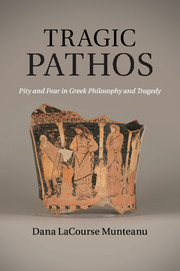Book contents
- Frontmatter
- Contents
- Preface and acknowledgments
- List of abbreviations
- Introduction
- Part i Theoretical views about pity and fear as aesthetic emotions
- Part ii Pity and fear within tragedies
- Chapter 5 An introduction
- Chapter 6 Aeschylus: Persians
- Chapter 7 Prometheus Bound
- Chapter 8 Sophocles: Ajax
- Chapter 9 Euripides: Orestes
- Appendix Catharsis and the emotions in the definition of tragedy in the Poetics
- Bibliography
- Index
Chapter 7 - Prometheus Bound
Published online by Cambridge University Press: 05 December 2011
- Frontmatter
- Contents
- Preface and acknowledgments
- List of abbreviations
- Introduction
- Part i Theoretical views about pity and fear as aesthetic emotions
- Part ii Pity and fear within tragedies
- Chapter 5 An introduction
- Chapter 6 Aeschylus: Persians
- Chapter 7 Prometheus Bound
- Chapter 8 Sophocles: Ajax
- Chapter 9 Euripides: Orestes
- Appendix Catharsis and the emotions in the definition of tragedy in the Poetics
- Bibliography
- Index
Summary
Context and interpretations: modern reactions
Prometheus Bound raises different problems than the Persians for the assessment of the audience responses. The internal structure of the play constantly presents the spectators’ various attitudes toward the suffering Prometheus. My analysis particularly examines how these internal attitudes may have intrigued contemporary audiences, through challenging the ethical, political, and religious ideas of the time.
Most critics agree that the Prometheus must have aroused compassion for the Titan, who redeems the human race. As G. Murray rightly notes, the characters appeal to fellow suffering in such a manner as almost to anticipate the Stoic doctrine of sympatheia, in which the pain of one individual affects the whole universe. Following Lessing's theory, Friedrich has argued that sympathy (Mitleid), in the sense of sharing suffering, best explains the nature of Aristotelian pity. He concludes that such feeling is prevalent in the Prometheus Bound, but I have to disagree with this view. Even though Aristotle's eleos presupposes involvement, as Friedrich states, it is also characterized by detachment, both personal and temporal. The one who pities relates to the sufferer by imagining that he (or his dear ones) might have endured in the past or endure in the future a similar misfortune. In the play, however, Prometheus’ pity for humans leads to self-sacrifice, not to imaginative reflection on the self. Pity compels the chorus to join the Titan in his final ordeal. Thus, pity in the play appears to require direct participation in a sufferer's misfortune rather than involvement mediated by imagination, which Aristotle prefers.
- Type
- Chapter
- Information
- Tragic PathosPity and Fear in Greek Philosophy and Tragedy, pp. 164 - 180Publisher: Cambridge University PressPrint publication year: 2011

